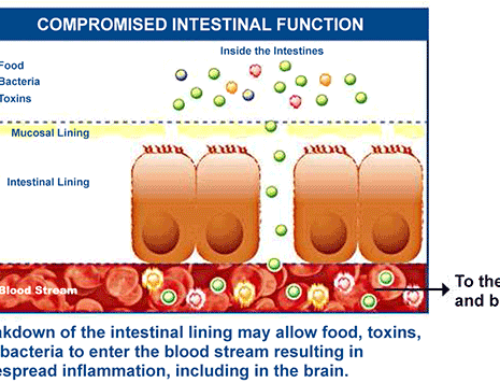by Dr. Tina Marcantel
Food sensitivity testing (or food intolerance testing) can be a very helpful tool to identify foods that can trigger a wide range of troublesome symptoms. Dr. Tina Marcantel is a Gold Canyon, AZ, naturopathic doctor who also serves the East Valley cities of Gilbert, Mesa, Chandler, Tempe, Scottsdale, Queen Creek, Apache Junction, and the greater Phoenix area.
 Just as some foods can be medicine for our bodies, it can also happen that certain common—and seemingly harmless—foods can trigger adverse reactions. We’ve all heard of people who have violent and even life-threatening reactions resulting from allergies to particular foods like peanuts or shellfish, but it’s also possible to develop chronic health conditions that are triggered by sensitivities (as opposed to allergies) to certain foods. Because the effects are subtler and tend to develop over time, the connection between diet and condition can often be overlooked. That’s where food sensitivity testing can be a very helpful diagnostic tool.
Just as some foods can be medicine for our bodies, it can also happen that certain common—and seemingly harmless—foods can trigger adverse reactions. We’ve all heard of people who have violent and even life-threatening reactions resulting from allergies to particular foods like peanuts or shellfish, but it’s also possible to develop chronic health conditions that are triggered by sensitivities (as opposed to allergies) to certain foods. Because the effects are subtler and tend to develop over time, the connection between diet and condition can often be overlooked. That’s where food sensitivity testing can be a very helpful diagnostic tool.
In the case of a food allergy, the body produces a substance called immunoglobulin E (IgE) antibodies in response to the presence of a particular protein. The reaction is often immediate—possibly within seconds or minutes—and signs and symptoms can include hives, difficulty with breathing, and in severe cases, anaphylaxis. Because these symptoms occur shortly after ingesting the problem food, most people with true food allergies are aware of them and have sought help from an allergist to identify the triggers and manage the allergy.
A food sensitivity (or food intolerance) is very different from a food allergy. In this case, the body overreacts to certain foods over a period of time—days, weeks, or months, although sometimes it can respond sooner. Immunoglobulin G (IgG) antibodies become sensitized to certain foods and release immune chemicals that can cause inflammation in the body tissues. The resulting symptoms may manifest as skin rash, joint aches and pains, sinusitis, asthma, insomnia, headaches, and digestive disorders producing bloating, gas, and poor food absorption.
A person with food sensitivities may also develop leaky gut syndrome, a condition in which the lining of the gut (mucosal membrane) has increased permeability that leads to food, bacteria, and toxins that are in the gut leaking into the bloodstream and causing inflammatory reactions throughout the body.
If a patient or his physician suspects that food sensitivities may be causing chronic problems, they may first start with a simple food elimination diet to try to identify the source. Common intolerances are dairy and wheat products and removing those from the diet may provide enough relief to identify them as the culprits. But for those who want a more accurate way of assessing how specific foods may be affecting them, a food sensitivity test can be very helpful.
A food sensitivity test is a blood test that can accurately measure the body’s cellular inflammatory response to substances including foods, additives, coloring, and chemicals. The laboratory I work with has tests that can cover up to 200 foods and spices and shows the client’s incompatible foods and the level of each reaction: severe, moderate, or mild. They also include a customized booklet of a rotational diet plan.
Although eliminating certain foods from your diet may seem like a simple treatment, the results can be dramatic. In one clinical example, my patient Peter did the food sensitivity panel along with his wife Linda and their teenage daughter Harriet. After we discussed the results from the lab, the family began following their food rotation plan. After just a few weeks on the new diet Peter reported that he and his daughter no longer needed the nebulizers they often used for asthma attacks on their hiking trips. Both Peter and Linda had an 80-90% reduction in joint pain and found they had lost excess weight, improving their flexibility and mobility. Harriet was happy to say that she was no longer embarrassed to wear short sleeves at school—her chronic problem with eczema had greatly subsided.
Even foods that have great nutritional value can become a problem if you eat them regularly and the body becomes sensitized to them. For instance, I ate almonds as a high protein snack between meals for years. When I took a food sensitivity test, the results showed a high intolerance to almonds. By eliminating them I also eliminated the inflammation that was causing the abdominal bloating and fatigue I had been experiencing.
If you have similar chronic ailments or complaints as those listed above and other investigations and treatments have reached a dead end, I’d suggest that you try food sensitivity testing. Make your health a priority. You’re worth it!
Ready to make your health a priority? Schedule your initial visit with Dr. Marcantel now!
See more of the specialty laboratory tests we offer
See our Health Videos/Articles Index page for a complete listing of videos and articles on DrMarcantel.com


